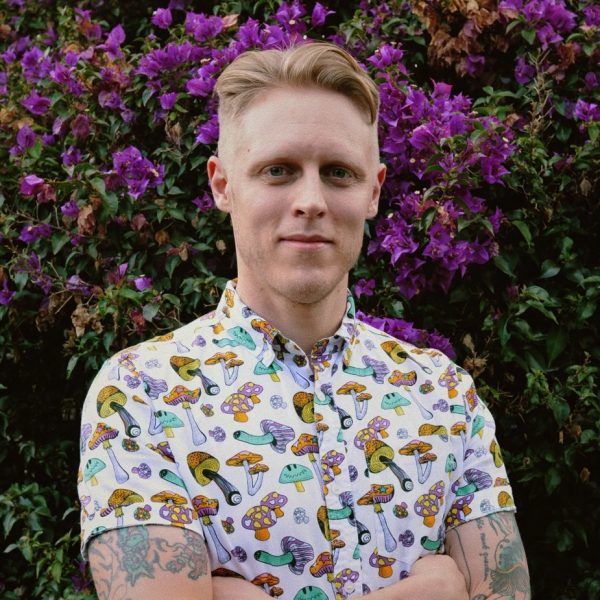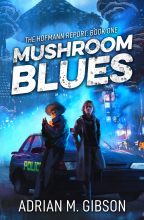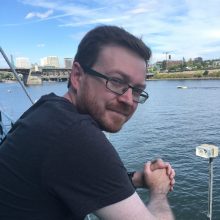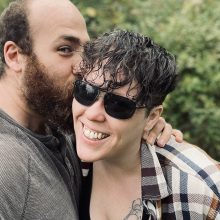Mushroom Blues by Adrian M. Gibson
What led you into writing?
I’ve been writing for most of my life, usually in combination with art. I never wrote fan fiction, but I spent years of my childhood filling three-ring binders with pages of fan comics. These comics would include the artwork and full scripts, dialogue, and all of that, and they were based on whatever fiction, TV, or movies I was obsessed with at the time. I just loved telling stories that could be enjoyed both visually and textually.
As I got older, I spent a lot of my twenties starting stories and never finishing them. I joke now that I was damn good at ideation, but I never had the follow through. All of that changed when I start to draw and write The Fungalverse, which eventually took shape as my first novel. (Side note: I shelved that book, but I’m now reworking it as my next release). Still, I finished something! I was so proud of that fact, but the process knocked me out—it put me through the grinder of how to outline, write a first draft, and a ton of other things that I sucked at. Ultimately, I needed a break from that book, so I started playing around with another idea in that same world. That “break project” evolved into Mushroom Blues, my debut novel.
How does a typical day look?
I have two young boys, so even though there is a “normal routine” (breakfast, getting ready for school, naps, playtime, bathtime, etc.), there is also a general unpredictability to most days. What I’ve found helpful is to have routine in as many aspects of my life as possible, from working out to answering emails to posting on social media to recording my podcast, that all the chaos that children can bring is somehwat more manageable.
In what ways do your characters test your abilities?
My characters beat the crap out of me, and I beat the crap out of them. I find that a story is most interesting when a character is being truly challenged, so it’s a big task for me to seek scenarios that will test their abilities. A lot of the time, that will involve them getting into dangerous and tricky situations (where they often get beat up). In turn, figuring out the nuances of a character, allowing them the room to become the truest version of themself, is a hard thing to achieve. It takes a lot for me to become fully confident in a character, so I wrack my brain, testing the boundaries of their skills, personality, quirks, etc. in order to figure out how to let them take the reins in the most effective way possible.
On top of that, I infuse a lot of myself into my characters, but I also incorporate difficult traits and experiences into them—things like addiction and abuse, war and trauma, where I don’t have first-hand knowledge. So, I spend a lot of time putting myself into their shoes, researching and reading, as well as imagining what it would feel like to have gone through something like that. Since Mushroom Blues is also a murder mystery, it meant putting myself into the heads of a variety of troubled characters, who are all battling demons of some kind. This took me to dark places, but the story itself is one of awakening and acceptance, so I found brightness amidst the shadows of my journey, as well.
What’s your setup?
My setup is pretty much ad hoc all the time. I have a big writing desk in my office, but I’m of the mindset that I write wherever I can, whenever I can. Be it at the kitchen table, writing in a notebook in the backyard, on the go on my phone—anywhere I’m able to write, I’ll take that opportunity, so long as I have a tool to write with.
What lasting effects have your favourite authors had on your writing and style?
Jeff VanderMeer is one of my all-time favorite authors, especially his book Annihilation and The Southern Reach Trilogy. Those three books changed my perspective on what literature (science fiction and fantasy, especially) can achieve. The emotions it can make a reader feel. The beauty and poeticism of prose. The immersion of a world. The mystery of a character and their circumstances. All of that comingled so brilliantly in Annihilation and its sequels, and reading those books made me want to pursue writing professionally.
As a result, VanderMeer has had a lasting impact on my approach to writing. My stories lean heavily into absorbing readers in a strange and surreal landscape, one where unexpected things happen, where the language on the page can convey both magic and horror. Mystery is key, as it propels the story forward, and not every question will be answered. Also, fungi. VanderMeer has written about mushrooms in such a captivating way, and that continues to inspire me, my love for fungi, and the ways they can be incorporated into fiction.
What do you do for inspiration?
Living life is the biggest inspiration for me. Whether it’s being out in nature (the Amazonian rainforest is a particular favorite, or anywhere in Ecuador, really), traveling the world, experiencing new things with my wife and sons, having conversations with interesting people, or even consuming media and stories (books, TV shows, comics, etc.). All of these things fuel my creativity, no matter if it takes the form of art, stories, or tattoos.
What repeating themes do you find yourself pulling into your stories?
Colonization is a big one for me, as it permeates so many circumstances. This can take the form of an individual being colonized by another individual or group, or a whole society and people that have been subjugated. I take this a step further in The Fungalverse world (and Mushroom Blues specifically), where colonization takes shape as both military conquest/occupation and as fungi/mycelium/spores that can creep into your body and (potentially) infect you. Another important theme for me is the relationship between humans and nature, how we interact with different natural systems and species in myriad complex ways. But also, how human beings tend to distinguish and separate themselves from nature, even though we are born and bred from it.
How do you wind down?
Winding down for me is pretty simple. Sunlight in the afternoon, whenever I can. Time outside with my family, breathing in the fresh air. After my boys are asleep, screens off and a good book is all I need.
What sort of challenges do you regularly overcome while designing your world/setting?
Worldbuilding and setting are not the aspects of writing that I find the most challenging—it’s usually where I start when crafting a story and a world. What I’ll do is illustrate a lot of what’s in my head, allowing the world to take shape visually. That process tends to breathe life into specific characters, scenarios, and scenes. The most difficult step is then figuring out what narrative will take place in that particular setting, and who are the right characters to tell it.
What are you reading at the moment?
I tend to mix and match when I’m reading, juggling a physical book, an eBook and a comic at the same time. Right now, I just finished System Collapse by Martha Wells in hardcover, and I’m reading Fevered Star by Rebecca Roanhorse in eBook, as well as a comic called A Study in Emerald by Neil Gaiman.
What’s the most useful advice you could give to an aspiring author?
Build connections and involve yourself in the community as early on as you can, especially before you release your first book. I benefited immensely from writing for the book blog FanFiAddict, getting to know authors, bloggers, and readers in the SFF community, as well as starting my podcast SFF Addicts. All of those experiences accrued over more than two years, culminating in tangible friendships, people I could rely on, and a deep support network who helped me during the writing of my book, as well as marketing, launch, and beyond. Isolating yourself in an already lonely line of work isn’t a fruitful path, so take a chance, put yourself out there, and find the folks who you genuinely connect with.
Tell us about the book you’re promoting.
Mushroom Blues is my debut novel, as well as the first book in The Hofmann Report series and The Fungalverse shared universe. It is a police procedural/murder mystery set in Neo Kinoko, a secondary world city inhabited by mushroom-headed people (fungals), which has been invaded and occupied by humans from another nation.
The story centers around homicide detective Henrietta Hofmann, as she begrudgingly teams up with fungal beat cop Koji Nameko in order to solve the mysterious murders and disappearances of children. This core mystery allows Henrietta and Koji to traverse a war-torn fungal metropolis, interacting with denizens across different social and political strata. It also opens Henrietta’s eyes to the realities of this city and the struggle of those surviving in Neo Kinoko, allowing her to finally confront the truths of her past traumas and transgressions.
👋 Hi! I run Author Interviews
As a new writer I found myself itching to contribute to a thriving, creative community, so I made Author Interviews and I've met loads of wonderful people in the process. You can buy my debut fantasy RINGLANDER: THE PATH AND THE WAY from Amazon.





